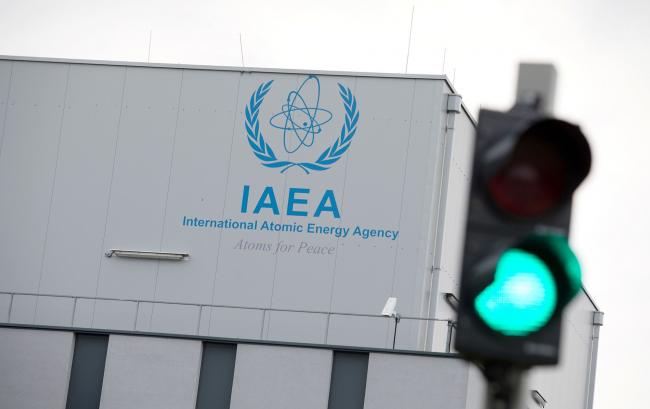(Bloomberg) -- The U.S. called for a special meeting of atomic inspectors to ramp up pressure against Iran after it violated restrictions set by the landmark nuclear accord. What it got is pushback from Russia, China and Europe, who blame the Trump administration for a crisis that threatens to escalate into war.
The International Atomic Energy Agency’s 35-member board of governors gathered on Wednesday at 2:30 p.m. in Vienna. American diplomats asked for the session after IAEA monitors confirmed Iran had exceeded enriched-uranium limits set under its 2015 deal with world powers.
“Iran’s current nuclear posture is clearly aimed at escalating tensions rather than defusing them, and underscores the serious challenges Iran continues to pose to international peace and security,” U.S. Ambassador to the IAEA Jackie Wolcott told the meeting.
While the State Department sought to marshal support for its “maximum pressure” campaign against Iran, other diplomats criticized President Donald Trump for withdrawing from the accord a year ago and reimposing sanctions on vast swathes of the oil exporter’s economy.
With accusations flying, the get-together exposed the growing international discord over how to contain a diplomatic crisis that has disrupted shipping and threatened to escalate into a new war in the world’s largest oil-producing region.
Iran’s Military Vows Retaliation for U.K. Seizing Oil Tanker (1)
“IAEA reported that new level of enrichment in Iran increased to 4.5%,” tweeted Russia’s IAEA Ambassador Mikhail Ulyanov before the meeting. “This is low enriched uranium that has nothing to do with nuclear weapons. Any member of IAEA may stockpile it without limits. Being under strict international control it constitutes no proliferation risk.”
France, Germany and the U.K. issued a joint statement on the eve of the meeting saying that while they were concerned by Iran’s violations, it’s the job of the remaining participants in the Joint Comprehensive Plan of Action, as the nuclear accord is known, to mediate disputes.
The EU hammered home that message on Wednesday, saying it was also keen to facilitate trade with Iran.
“The EU deeply regrets the U.S. withdrawal and calls on all countries to refrain from taking any actions that impede the implementation of the JCPOA commitments,” it said.
The IAEA meeting takes place as French President Emmanuel Macron’s top diplomatic adviser visits Iran for discussions, seeking to persuade the Islamic Republic to reverse course.
Emmanuel Bonne met Foreign Minister Mohammad Javad Zarif and Ali Shamkhani, secretary of Iran’s Supreme National Security Council. Shamkhani said Iran would continue with its policy of gradually abandoning some of its nuclear commitments until its “rights” were upheld. Iran says European partners should ensure it’s able to enjoy the economic benefits promised by the deal despite U.S. penalties.
French officials say they see room for compromise as Iran’s infringements have been carefully calibrated and Trump has underlined his desire for new talks. Iran’s dialogue with Europe never stopped but it said it won’t speak to the U.S. unless sanctions are eased first.
Tehran’s contraventions have increased pressure on European nations who’ve urged Iran to stick with the deal even as they struggle to find a mechanism that would allow it to keep selling its oil. They’ve come up with a trade vehicle called Instex that would protect some trade with Iran from U.S. penalties but would initially be limited to food and drugs.
Iran is producing oil at the slowest clip since 1986, making U.S. sanctions as effective as the devastating Iraq-Iran war that ended more than 30 years ago. The measures have hit the currency, fueled inflation and hobbled growth.
U.S. officials say the squeeze is meant to push Iran to negotiate a broader deal that also limits its missile program and support for proxy militias in the region. But the approach has weakened the hand of moderate President Hassan Rouhani, who called Wednesday’s meeting “ridiculous”, and prompted hardliners to dig in.
"The Americans, on one hand, say the JCPOA was a very bad deal, even the worst deal and they left it,” he was quoted as saying by the official Islamic Republic News Agency. “On the other hand, when Iran diminishes some of its commitments everyone expressed worry.”
Critically, Iran has continued allowing IAEA inspectors to conduct what Director General Yukiya Amano calls “the most robust verification system in existence anywhere in the world.” The safeguards account for gram-level amounts of enriched uranium to ensure they aren’t diverted for weapons. The agreement gave monitors unique powers in Iran, where they called record snap inspections last year.
China’s IAEA envoy, Wang Qun, accused the U.S. of using “unilateral coercive measures” at a meeting in the Austrian capital earlier this month. By reimposing sanctions, Washington itself could stand accused of violating the United Nations charter and international law, he said.
“The United States will be trying to create pressure out of the fact that Iran has ceased implementing some of the restrictions which the agreement requires,” said Peter Jenkins, a former U.K. diplomat who helped lead nuclear negotiations with Rouhani before he became president. “This is very different from failing to comply with IAEA safeguards obligations.”
